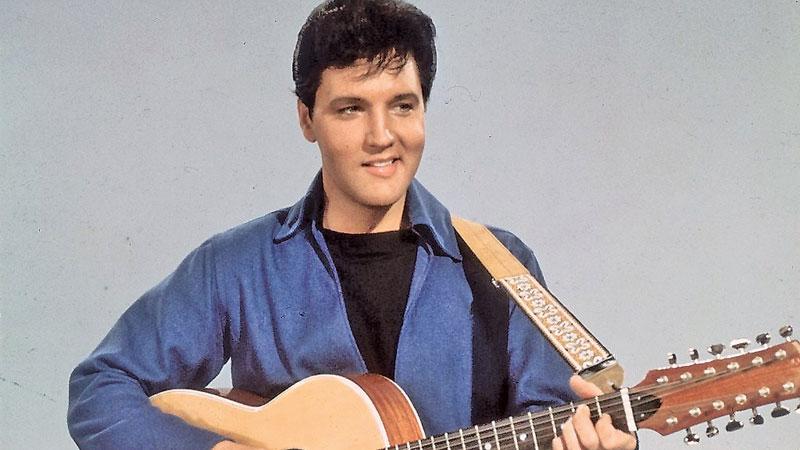
With a third of young adults having never heard an Elvis song and the value of his merchandise sinking, is the king of rock’n’roll destined to be remembered as nothing more than a goofy tribute act?
Forty years since his death, Elvis Presley’s image remains one of the most iconic in music history. The same cannot be said for his songs, however: according to a snap YouGov poll of 2,034 British adults, a hefty 29% of 18- to 24-year-olds said they had never listened to an Elvis song, with none of this age group listening to him daily and only 8% listening monthly. Asked what they thought of other veteran stars, about twice as many said, they liked the Beatles (23%) and David Bowie (25%) “a lot” compared with the King (12%).
Even if there’s evidence of dwindling reverence among millennials, the YouGov data clearly shows Elvis’s popularity among older generations. Despite this, with the value of rare Elvis merchandise in freefall, his Graceland estate will be acutely aware of the financial repercussions of failing to connect with younger audiences, even as the 40th anniversary of his death approaches.
There’s no denying Elvis maintains posthumous popularity: Spotify reveals he achieved 382m streams in 2016. Yet, compare this to other deceased stars such as Bowie (who clocked in at more than 600m), Michael Jackson (also more than 600m), or the long-disbanded Beatles (1.3bn), and these numbers look less impressive. Elvis has fallen to the status of “novelty act”, according to David Hesmondhalgh, an author and professor of music at the University of Leeds, who says that any musician whose image transcends their music will ultimately fade away: “If you ask a small child about Elvis, the fact he died on a toilet through overeating or wore a silly suit is all that registers. The music has become far less important than the caricature. His image has been cheapened.” “Any fat bloke can throw on an Elvis costume and sing stupidly down the pub for £100,” agrees Lee Arthur, the founder of A1 Star Tributes, a firm that brands itself as Europe’s top tribute act agency. “I don’t know about America, but it’s really damaged demand over here.” Elvis tribute acts were once big business, but with so many cheap knock-offs, Arthur says punters are now more interested in Gary Barlow and Michael Bublé lookalikes.
The agency has 10 “professional” Elvis impersonators on its books, who will belt out a pitch-perfect Hound Dog and pose in wedding photos with your nana for £450. Arthur, however, says he can charge at least double that for his Michael Jackson impersonators. “With MJ, the audience can have more of a dance and a singalong.”
This dominance came before the emergence of the concept album in the mid-60s, when LPs such as Rubber Soul and Pet Sounds would evolve the idea of modern pop music. “Elvis was an excellent singles artist,” explains Hesmondhalgh. “He emerges before the formation of rock culture as we know it, so the mythology of the original rock album was lost on Elvis. He doesn’t have anything near a Sgt Pepper for young people to connect through.”
William Kaufman, professor of American literature and culture at the University of Central Lancashire, says Elvis’s image suffered from allegations of racism and cultural appropriation.
In 1989, Chuck D used Public Enemy’s political anthem Fight the Power to rap: “Elvis was a hero to most / But he never meant shit to me / Straight up racist, the sucker was / Simple and plain,” as FlavourFlav punctuates his verse with the ad-lib: “Muthafuck him and John Wayne!” It’s an insult that has endured.
“While I can’t see black culture ever embracing Elvis, there is certainly the potential for a hipster-led revival. In the era of Trump, the idea of Elvis as an absurd camp figure could also work well,” he adds. “But equally, maybe we should just accept that Elvis’s moment has passed.”
- Theguardian
